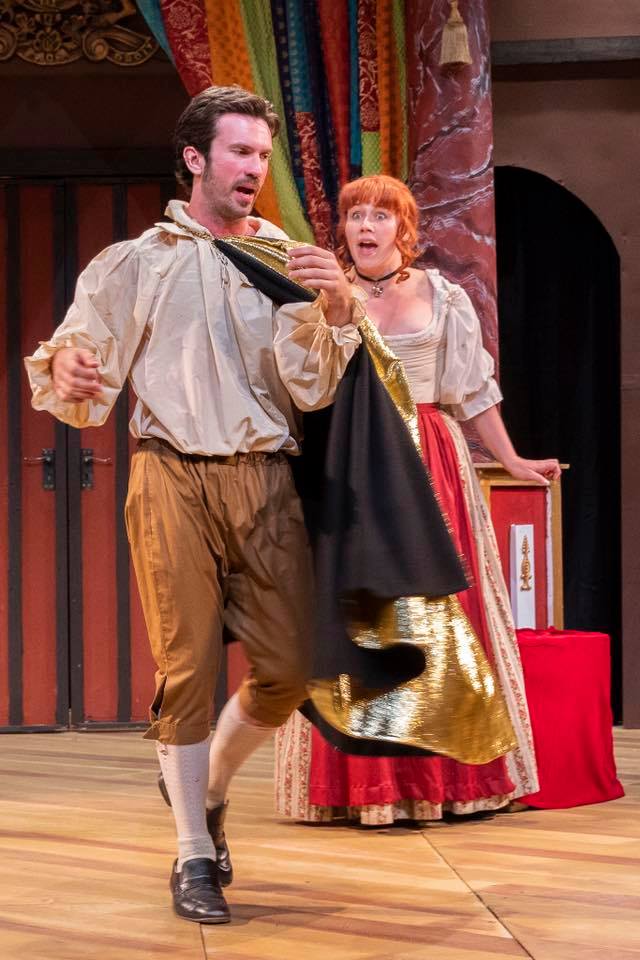
Player Charles Hart (Emmett Lee Stang) teaches Nell Gwynn (Charlotte Wright) how to act.
If you’re not having a good time onstage, you shouldn’t be there. Everybody in this cast of Nell Gwynn deserves to be onstage: they are having a fucking laugh riot. And their pleasure is infectious: the evening is infused with joy.
Playwright Jessica Swale shows us her version of Nell Gwynn, the most famous actress of Restoration theatre and the longtime lover of Charles II. Gwynn’s prominence is astonishing because she began her life not just in poverty but in the bawdy house where her dipsomaniac mother toiled. In Swales’s telling, Gwynn herself was a prostitute at one point.
And, of course, prostitution comes in many forms: as Charles’s favourite, Gwynn was no doubt one of the best-paid mistresses in Christendom. And she was unapologetic. In a well-documented historical incident that we see a variation of in the play, Gwynn was travelling through London in her coach when the crowd outside mistook her for a woman who was a rival for Charles’s interest and they started hurling insults. “Good people, you are mistaken,” Gwynn smiled and said. “I am the Protestant whore.”
Swales’s play cuts a wide, though shallow swath that includes Gwynn’s transition from being an orange seller in the theatre to becoming an actress on the stage and her later attempts to negotiate the machinations of life at court.
A lot of the comedy is broadly goofy. Before the Restoration, women weren’t allowed to perform and, when Nell auditions for one of the King’s companies, an actor named Hart and an actor named Kynaston, who has made his living playing women’s roles, are both there. “I think she has something unusual,” Hart declares. “Syphilis?” Kynaston asks. Some of the goofiness plays with the anachronistic: “The French have arrived,” Nell complains, “and they’re all driving on the wrong side of the cobbles.”
But within this freewheeling sensibility there is substantial content. Nell urges the company playwright John Dryden to create credible female characters. “We are as knotty and tangly as you are,” she insists. And, in celebrating Nell’s gender and sexuality—“I swapped selling my oyster for my oranges, didn’t I?”—the play also celebrates theatre. Before Charles was returned to the throne, the Puritan Oliver Cromwell had shuttered the playhouses for 18 years. So, in her ebullience, Gwynn embodied not just the relief and release of her age but also the playfulness of her art form. And playwright Sales leans into this idea, reminding us explicitly that theatre can be a place of fun—and loading her script with sometimes-dirty songs: “I can dance and I can sing / And I can do the t’other thing.”
In this United Players production, director Adam Henderson has cast the confident, charismatic Charlotte Wright as Nell Gwynn. It’s a crucial casting choice and it pays off big time. Playing Hart, Emmett Lee Stang is similarly generous—honestly openhearted, yet able to put full comic spin on elements such as the Spanish-inspired song he sings.
As the self-dramatizing Kynaston, Brian Hinson is called upon to chew the scenery, which he does with the enthusiasm of a starving beaver. Mattie Shisko brings a wry sensibility to a company member and reluctant actress named Nancy. And, especially in Act 2, Matt LeBlanc has fun as Charles: “Forgive me, Father, for I have sinned. A lot!”
Wisely, Henderson and set designer Chris Bayne give us a colourfully accessorized thrust stage, which keeps the action virtually in our laps. And, right down to Hart’s holey hose, CS Fergusson-Vaux’s huge array of costumes are mostly successful.
All of that said, the show’s not perfect. In this production at least, some of the writing looks clumsy. I’m thinking, for instance, of a scene in which Dryden rewrites a play with the help of female company members, and about a running gag in which Kynaston goes on about his characters’ motivations. In the second half of Act 1, the court intrigue flags and so does the romance between Gwynn and the King, which feels like a dully commercial interaction at that point.
But the triumph of this production is that it releases the essential joy in the script. The lion’s share of the credit for this stylistic consistency must go to Henderson.
And the historical material is phenomenal. Charles II’s last words, which are repeated here, were, “Don’t let my poor Nellie starve.”
NELL GWYNN By Jessica Swale. Directed by Adam Henderson. A United Players production. At the Jericho Arts Centre on Thursday, June 7. Continues until June 24.
NEVER MISS A REVIEW: To get the best of my theatre writing, including my reviews, once a week, sign up for FRESH SHEET, my free weekly e-newsletter.
And, if you want to keep independent criticism alive in Vancouver, check out my Patreon page. Newspapers are dying and arts journalism is often the first thing they cut. Fight back!





Thanks Colin. “What’s the point of having a (theatre) if it’s sapped of all joy?”